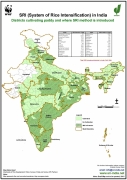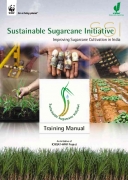ICRISAT
Comparing conventional and organic farming crop production systems - Inputs, minimal treatments and data needs - A research paper
Posted on 19 Apr, 2011 02:45 AMThe following article is based on a field experiment in International Crops Research Institute for the Semi-Arid Tropics (ICRISAT), where low cost farming systems that involve use of biological inputs obtained from the field is compared with conventional farming.
Further, the authors offer suggestions for future demonstration and verification experiments, to study the virtues of organic farming.
System of Rice Intensification and Paddy Cultivation - Maps developed by the WWF-ICRISAT Project
Posted on 14 Jun, 2010 06:23 PM Paddy, one the country's staple crops is cultivated all over the country, barring parts of Jammu and Kashmir, Gujarat and Rajasthan. This set of interesting maps about Paddy and System of Rice Intensification (SRI) from the SRI India website, maintained by the WWF-ICRISAT Project (a joint initiative of WWF and ICRISAT), give a bird's eye view of the districts under Paddy and SRI Paddy cultivation, and the Paddy productivity in various districts of the country.
Paddy, one the country's staple crops is cultivated all over the country, barring parts of Jammu and Kashmir, Gujarat and Rajasthan. This set of interesting maps about Paddy and System of Rice Intensification (SRI) from the SRI India website, maintained by the WWF-ICRISAT Project (a joint initiative of WWF and ICRISAT), give a bird's eye view of the districts under Paddy and SRI Paddy cultivation, and the Paddy productivity in various districts of the country.
Districts with Paddy cultivation and where SRI approach has been introduced: Of the total 604 districts in India, paddy is cultivated in 564 districts. Of these, in 246 districts, SRI paddy cultivation approach has been introduced (data as of 2010). The spread of SRI has been most widespread in Uttarakhand, Eastern Madhya Pradesh, Orissa, Jharkhand, West Bengal, Andhra Pradesh, Tamil Nadu and Karnataka, as 50-95% of the districts in these regions/states have presence of SRI.
Sustainable Sugarcane Initiative - Improving Sugarcane Cultivation in India - Training Manual developed by WWF India and ICRISAT
Posted on 09 Jun, 2010 01:25 AM Sustainable Sugarcane Initiative (SSI) is an approach to the cultivation of sugarcane, that can reduce inputs - water, chemical fertilizers, seed material and farm space - while improving sugarcane production significantly. It also reduces crop duration and provides a longer period of the cane crushing season to the sugar industry.
Sustainable Sugarcane Initiative (SSI) is an approach to the cultivation of sugarcane, that can reduce inputs - water, chemical fertilizers, seed material and farm space - while improving sugarcane production significantly. It also reduces crop duration and provides a longer period of the cane crushing season to the sugar industry.
This farm-based approach (as opposed to crop-based) also gives farmers options to grow intercrops, such as pulses to improve their income. Most importantly, SSI reduces the overall pressure on water resources and contributes to recovery of ecosystems. It conserves soil moisture, thereby allowing for growing of dryland crops in the same region.
SSI is inspired from the successful approach of System of Rice Intensification (SRI) paddy cultivation, which like SSI, originated from farmers and civil society to improve agricultural productivity while reducing pressure on natural resources.
Sustainable groundwater development through integrated watershed management for food security - A research report by ICRISAT
Posted on 15 Apr, 2010 04:45 PMThis paper by ICRISAT discusses the results from on-farm community watersheds through groundwater management as the drivers for sustainable management of watersheds in dry land areas. The issues of sustainable development and management of the groundwater resource through integrated watershed management (IWM) approach are also dealt with, in the context of food production and security.
System of rice intensification (SRI): a training booklet from WASSAN
Posted on 02 May, 2009 11:29 AMSystem of rice intensification (SRI) is a improved method of rice cultivation that was developed in 1983 in Madagascar and has now spread to many parts of the world. There is a notion that what has been done in research plots and by scientists is modern and desirable.
Towards a learning alliance on system of rice intensification in Orissa – a report on dialogue project by WWF International and ICRISAT
Posted on 01 May, 2009 12:52 PMThe report is divided into four parts. Part I speaks about the overall context of rice cultivation in Orissa (of which Nuakhai is a part) and the crying need for change by most actors involved. In part II the background of SRI in India is sketched broadly and in part III the SRI work in Orissa is situated within the overall context of rice in the state.